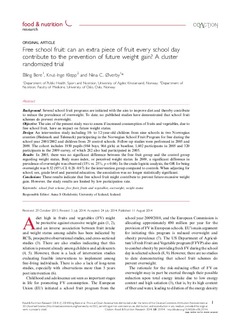| dc.contributor.author | Bere, Elling | |
| dc.contributor.author | Klepp, Knut-Inge | |
| dc.contributor.author | Øverby, Nina Cecilie | |
| dc.date.accessioned | 2014-09-19T11:54:51Z | |
| dc.date.available | 2014-09-19T11:54:51Z | |
| dc.date.issued | 2014 | |
| dc.identifier.citation | Bere, E., Klepp, K. I., & Overby, N. C. (2014). Free school fruit: can an extra piece of fruit every school day contribute to the prevention of future weight gain? A cluster randomized trial. Food & Nutrition Research, 58. | nb_NO |
| dc.identifier.issn | 1654-661X | |
| dc.identifier.uri | http://hdl.handle.net/11250/220680 | |
| dc.description.abstract | Background: Several school fruit programs are initiated with the aim to improve diet and thereby contribute to reduce the prevalence of overweight. To date, no published studies have demonstrated that school fruit schemes do prevent overweight.
Objective: The aim of the present study was to assess if increased consumption of fruits and vegetables, due to free school fruit, have an impact on future weight status.
Design: An intervention study including 10- to 12-year-old children from nine schools in two Norwegian counties (Hedmark and Telemark) participating in the Norwegian School Fruit Program for free during the school year 2001/2002 and children from 29 control schools. Follow-up studies were performed in 2005 and 2009. The cohort includes 1950 pupils (984 boys, 966 girls) at baseline, 1,602 participants in 2005 and 320 participants in the 2009 survey, of which 282 also had participated in 2005.
Results: In 2005, there was no significant difference between the free fruit group and the control group regarding weight status, Body mass index, or perceived weight status. In 2009, a significant difference in prevalence of overweight was observed (15% vs. 25%, p=0.04). In the crude logistic analysis, the OR for being overweight was 0.52 (95% CI: 0.28-0.97) for the intervention group compared to controls. When adjusting for school, sex, grade level and parental education, the association was no longer statistically significant.
Conclusions: These results indicate that free school fruit might contribute to prevent future excessive weight gain. However, the study results are limited by low participation rate. | nb_NO |
| dc.language.iso | eng | nb_NO |
| dc.publisher | Swedish Nutrition Foundation | nb_NO |
| dc.rights | Navngivelse-Ikkekommersiell 3.0 Norge | * |
| dc.rights.uri | http://creativecommons.org/licenses/by-nc/3.0/no/ | * |
| dc.title | Free school fruit: can an extra piece of fruit every school day contribute to the prevention of future weight gain? A cluster randomized trial | nb_NO |
| dc.type | Journal article | nb_NO |
| dc.type | Peer reviewed | nb_NO |
| dc.rights.holder | © 2014 The Author(s) | |
| dc.subject.nsi | VDP::Medical disciplines: 700::Health sciences: 800::Nutrition: 811 | nb_NO |
| dc.source.pagenumber | 5 | nb_NO |
| dc.source.volume | 58 | nb_NO |
| dc.source.journal | Food & Nutrition Research | nb_NO |
| dc.identifier.doi | https://doi.org/10.3402/fnr.v58.23194 | |

